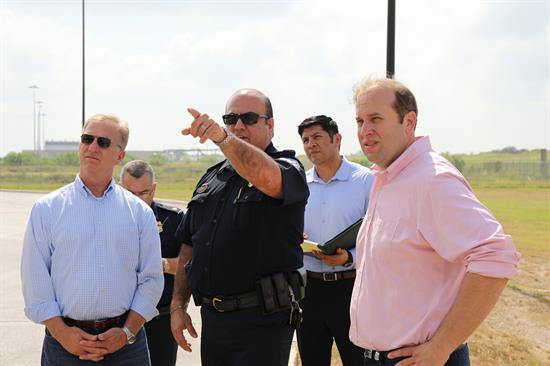Articles
The Border Crisis: My Firsthand ExperienceBy Representative Kevin Hern
Tulsa, OK ,
June 16, 2019
|
Miranda Dabney
Partisan talking points are insignificant in the face of reality of the humanitarian and national security crisis on our hands. Here are the facts: in the month of May alone, 144,237 people were apprehended crossing the border illegally, totaling 650,000 since the start of 2019. In 2017, there were about 25,000 apprehensions per month, a 576% increase in less than 2 years. This puts an incredible strain on our border patrol agents and should alarm us all. Last week, I traveled to our Southern border with a bipartisan Congressional delegation of my freshman colleagues in order to see the facts and speak firsthand with the people dealing with these issues every day. Politicians in D.C. can debate talking points on immigration policy all day long, but nearly 1,800 miles away in McAllen, Texas, our failure to solve immigration has a real and negative impact on border communities. Traveling down to our Southern border was an eye-opening experience. We stopped at the Hidalgo port of entry which sees about 9,000 cars a day and the Pharr entry which sees 2,400 trucks a day. The technology they have to screen vehicles is incredible – but they only have the manpower to screen 20% of the cars that come through. The drug smugglers know this, and they’re counting on it. We saw hand-crafted coconuts filled with methamphetamine liquid, the border agents had to crack open more than 12,000 of them to get the methamphetamine out of them. The detention facilities were massively overpopulated. It’s mid-morning and the temperature was already nearing 100 degrees, a miserable kind of heat. Sections of wall are built a couple miles in from the border since the Rio Grande meanders through the region, which means that migrants who make it across the river and to the base of the wall are still on American soil. Many of these migrants are unaccompanied minors who have been sent across the border by coyotes, the people who facilitate and coordinate illegal crossings (but never actually cross the border themselves), and are instructed to find the men in the green uniforms – known to us as Customs & Border Protection agents. The coyotes – who are estimated to make $81 million per month from smuggling people across the border – know that border patrol will take care of the kids and release them into the country after the 20-day holding period expires. The overcrowded detention centers slows the processing of new migrants to the point that the holding period expires and there’s nothing CBP can do but release them. There have been 200,000 families released into the country this year with court dates for asylum hearings, but 90% of them will never show up. We drove up to one of these processing stations where seven people were being processed: a man from El Salvador, a woman from Honduras, two teenagers, and three small kids. The agents at this station told me they process 800 people per day, a little more than half of which are children under the age of eight. This is what President Trump is talking about when he says it’s a humanitarian crisis; this is the issue we must solve. There are thousands of stories I could share from my brief trip to the border last week, but I’ll leave you with these final thoughts. I think all of my colleagues on this trip came home with an entirely new perspective on border security. Seeing the situation for yourself only legitimizes the fact that there is an humanitarian crisis and we cannot wait another moment to solve it. Many of my colleagues refuse to go to our Southern border because they don’t want to be confronted with the fact that they are pushing false information. When you see the crisis for yourself, any political vendettas fade away. After my experience last week, my beliefs are reaffirmed. Sending our border agents out to protect our country without the funding they need is like sending firefighters into a burning building without a hose. I pledged to support the men and women serving this country and plan to keep that promise. We need more funding for our border patrol to increase screenings of vehicles, speed up deportations, and fund more border structures to prevent illegal crossings in the first place. |

